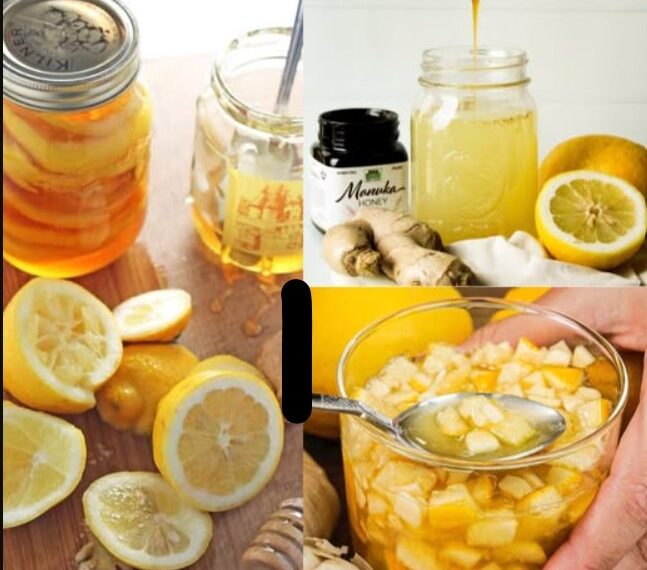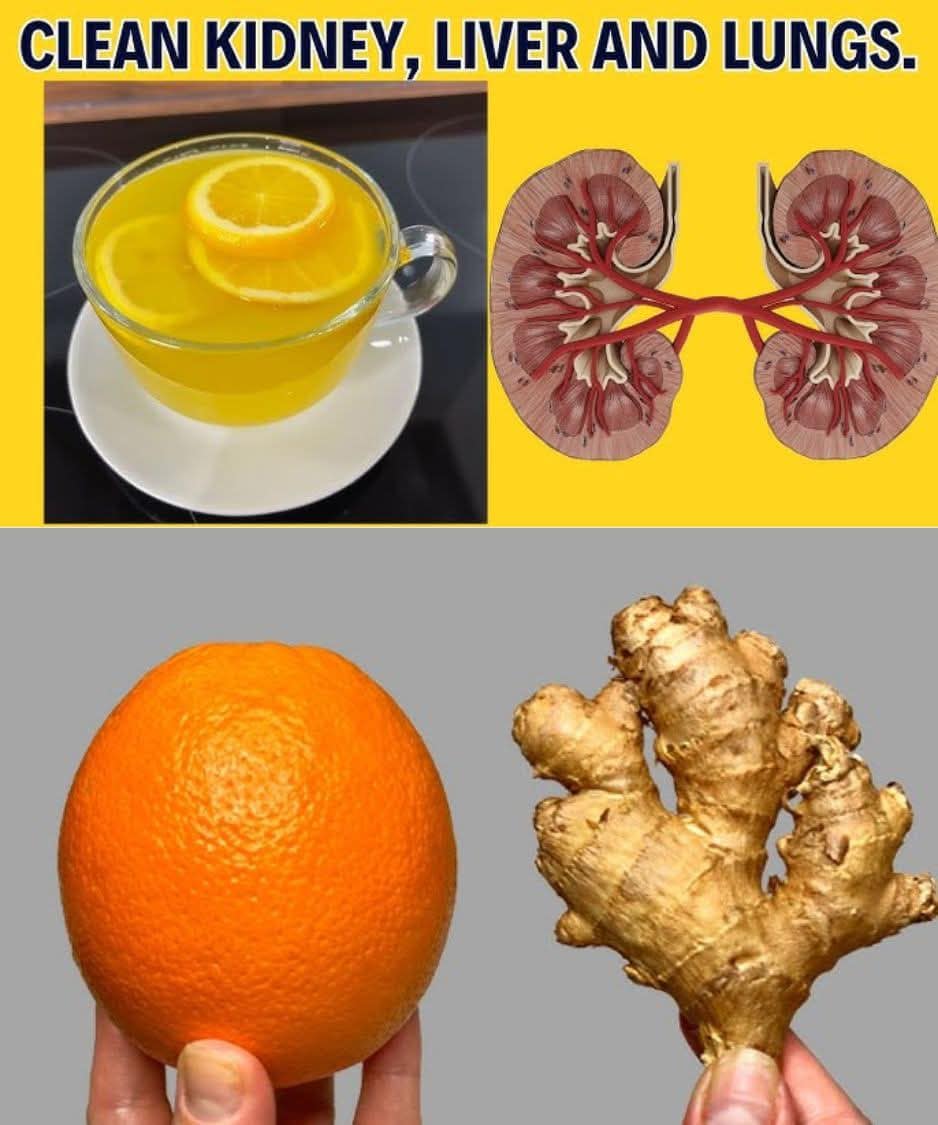- Honey is appreciated for its soothing effect, especially on throats. It contains antioxidant compounds (flavonoids, phenolics) and, owing to its low water activity, a modest antimicrobial capacity.
- In folk medicine, honey is commonly used to calm coughs, relieve throat irritation, or even dress minor wounds (topical use).
But honey is not a cure-all, and it’s contraindicated in infants under 1 year due to risk of infant botulism.
Ginger (Zingiber officinale)
- Ginger is known for its anti-inflammatory properties (thanks in part to gingerols), its promotion of digestion (relieving nausea, bloating), and its mild antioxidant effects.
- It is also used traditionally to help clear respiratory passages in colds.
Onion
- Onion is rich in sulfur-containing compounds, flavonoids (especially quercetin), and antioxidants. It has been studied for antimicrobial, anti-inflammatory, and cardiovascular benefits.
- Certain compounds in onion may also support a healthy gut microbiome (prebiotic potential).
Lemon (juice)
- Lemon provides vitamin C, an essential nutrient for immune function.
- Its citric acid gives it acidity, which may help preserve the mixture and possibly support absorption of other compounds.
- In folk health, lemon is often credited with “cleansing” or detoxifying the liver or blood.
How to Prepare This “Amazing” Mixture
Here’s a commonly recommended method for making this remedy:
Ingredients:
- 4 cloves garlic
- 1 small onion
- About 2 cm fresh ginger root (grated)
- Juice of one fresh lemon
- 1 tablespoon of honey
Preparation steps:
- Finely mince or crush the garlic.
- Chop or slice the onion, then mince or finely dice it.
- Grate the fresh ginger.
- Squeeze the lemon juice into a bowl.
- Combine the garlic, onion, and ginger in a container.
- Add the lemon juice, then mix in the honey.
- Stir until the mixture is fairly smooth and homogeneous.
- Optionally, let it rest (in the refrigerator) for several hours or overnight to allow flavors to meld.
Suggested “dosage”:
- Preventive use: one teaspoon daily on an empty stomach
- During a cold or mild infection: 2 to 3 times per day
- Some people dilute the spoonful in warm (not hot) water for a gentler drink
Storage:
- Use a clean glass jar with a tight lid
- Keep in the refrigerator
- Many sources suggest consuming within 2–3 weeks
- The acidity from the lemon helps somewhat with preservation
- Discard the mixture if it shows signs of spoilage (odd smell, mold, excessive separation)
Why This Combination Is Often Touted
Synergy of bioactive compounds
The appeal lies in synergy: the idea that combining multiple beneficial ingredients yields more effect than each ingredient alone.
- Honey can act as a vehicle or “carrier” for antimicrobial compounds from garlic and ginger.
- Lemon’s acidity helps preserve certain compounds and may aid absorption.
- The onion adds quercetin and other flavonoids, which complement antioxidant power.
Claimed benefits (popular narratives)
Proponents often attribute the mixture with abilities to:
- Boost immunity and help prevent viral or bacterial infections
- Ease cold and flu symptoms
- “Detoxify” or “purify” the blood
- Improve digestion, reduce bloating
- Support liver detoxification
- Help regulate blood pressure and cholesterol
- Support metabolic function or weight loss
- Act as a general anti-inflammatory
- Promote healthy circulation
These claims proliferate on blogs, social media, and alternative health sites—but many lack rigorous scientific backing.
What Science Says: Evidence & Limitations
It is critical to approach such remedies with healthy skepticism. While elements appear promising individually, strong clinical evidence for the whole blend is lacking.
Limitations of existing data
- Much of the research is in vitro (done in test tubes) or in animals, using high concentrations that are difficult to mimic in a dietary dose.
- Controlled human trials of such mixtures are rare.
- The claim that this concoction acts as a “natural antibiotic” or can cure serious infections is not supported by scientific literature. A fact-check investigation concluded: there is no strong evidence that home mixtures of garlic, honey, lemon, ginger function as reliable antibiotics.
- In real-life conditions (complex human physiology), absorption, metabolism, and interactions complicate outcomes.
Safety and side effects
- Garlic and ginger possess anticoagulant (blood‑thinning) properties, which could interfere with medications like warfarin or other blood-thinners.
- High amounts of raw garlic can irritate the lining of the stomach or cause heartburn, gas, or gastrointestinal upset.
- The acidity of lemon may aggravate acid reflux (GERD) or ulcers.
- Honey is unsafe for infants under 1 year (infant botulism risk).
- Some people might be allergic to garlic, onion, or ginger.
- The mixture includes moist ingredients (onion, crushed garlic), which increases the possibility of fermentation or microbial growth, especially if storage is improper.
Contamination & spoilage risks
Using fresh ingredients introduces moisture, which can promote growth of unwanted microbes if containers or utensils aren’t sterile. Although honey has mild antimicrobial qualities, it is not a guarantee against spoilage in a mixed preparation. Some herbalist communities have cautioned about fermentation or decomposition if stored too long or at improper conditions.
Therefore, strict hygiene and prudent storage are essential:
- Use clean, sterilized jars
- Refrigerate promptly
- Consume within 2–3 weeks
- Discard at first sign of spoilage
Practical Tips for Safe & Effective Use
Here are recommendations to make use of this mixture wisely:
- Start small
At first, take only half a dose to test tolerance (stomach sensitivity, taste). - Do not replace medical treatment
Infections, fevers, or serious illnesses demand medical evaluation and treatment. - Use it as a complement, not a cure
Consider it a support to immunity or wellbeing, in concert with diet, rest, hygiene, and medical care. - Choose quality ingredients
Fresh garlic, fresh ginger, organic onion if possible, raw (unprocessed) honey, fresh lemon. - Ensure proper storage
Use a clean glass jar, airtight lid, keep refrigerated, and use promptly. - Take it at a tolerable time
Many people take it first thing in the morning (on an empty stomach) to “kickstart” digestion and immunity. - Adjust or stop if adverse effects
If you feel burning, nausea, or discomfort, reduce or halt usage. If you have ulcers or acid reflux, consult a physician before taking regularly. - Check drug interactions
If on anticoagulants, blood pressure medicines, or digestive medications, consult your physician.
Anecdotes, Variants & Community Use
Many personal stories exist about using this mixture to alleviate colds or support immunity, sometimes with added ingredients like black pepper, turmeric, cayenne, or fermented versions. These accounts are interesting but anecdotal, not scientific proof.
For example, on a forum, one user wrote:
“Raw onion, 2 cloves raw garlic and raw honey got mixed together fixed my cold/flu in record time … congestion gone in 1.5 days … best part of my day taking it but 💯 worth it.”
Such testimonials are compelling, but they don’t substitute for controlled trials. They may also include placebo effects, other lifestyle changes, or mild infections that were self‑resolving.
Summary: Benefits Possible — But with Limits
| Claimed Benefit | Strength of Evidence | Notes & Caveats |
|---|---|---|
| Immune support / prevention of infections | Moderate plausibility (antioxidants, antimicrobials) | Does not guarantee protection |
| Relief of cold / flu symptoms | Possible adjunctive benefit | Not a stand-alone therapy |
| Anti‑inflammatory effects | Reasonably plausible | Likely modest in food doses |
| Improved digestion / reduced bloating | Relatively credible (ginger, onion) | Take moderate doses |
| Detoxification / cleansing claims | Speculative | The body already detoxifies via liver & kidneys |
| Blood pressure / cholesterol modulation | Some supportive evidence (garlic, onion) | Effects are small |
| Metabolic / weight support | Weak to uncertain | Lifestyle matters more |
In short: this blend could provide a gentle “boost” to health or symptom relief, but it is not a cure-all. For real health challenges, medical evaluation and treatment are essential.
Conclusion: A Natural Helper, Not a Panacea
The combination of garlic, honey, grated ginger, onion, and lemon juice is a traditional remedy steeped in folk wisdom. Its components offer interesting bioactive compounds — antioxidants, anti-inflammatories, modest antimicrobials — and used judiciously, it may support general wellness, especially in mild illnesses or seasonal challenges.
However, this elixir is not magical. Scientific evidence remains limited regarding its ability to cure serious disease, and misuse or overreliance can carry risks. Approach it as a complementary support rather than a replacement for medical care.
If you like, I can also prepare a scientific review of each ingredient (with research citations) or a customized version (e.g. for cough, digestion, immunity). Would you prefer that?





